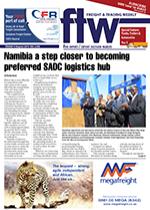The thorny issue of airport security staff screening people based on what they look like and how they behave could be significantly addressed through the introduction of technology, Eytan Nevo of Advisory, Technology and Logistics (ATL) has said. Speaking at a conference by the Transported Asset Protection Association (Tapa), the managing director of ATL SA was answering a question about the cultural sensitivity of making certain assumptions, when he touched on tech. “If profiling is subjective but you take the human element out of it, would (computer-based) profiling based on racial, religious, and ethnic grounds still be subjective?” According to Nevo, an Israeli-born security expert living in South Africa, his home country has already made significant strides through technology called Suspect Detection Systems, or SDS. By way of using human pattern behaviour recognition software, SDS picks up on several clues or give-away signals that could flag potential threats without being subjective, because the screening is digitally done. Complex computerised security checking is also not the only complicated method of safety verification applied by Israeli airport security. At Ben Gurion International Airport, security personnel are trained to watch passengers closely to identify those that really merit thorough searching and frisking opposed to the usual practice of going through each and every person’s luggage. Israeli airport security believe their system of comprehensive profiling saves time by only homing in on the individuals that really deserve to be “detected and deterred”. Said Nevo: “In Israel the screening process actually starts long before you get to the airport. Before you even get out of your car someone has already started engaging with you to see whether you’re okay” – and it’s not’s to see if you’re feeling well. Apart from physical signs, the process also involves verification questions. Nevo himself was subjected to some verbal scrutiny on a recent trip to Israel where he had to prove that the woman he was travelling with was his wife, especially as they have different surnames. “When I told security we’re married, they said ‘prove it!’ Well, how do you do that? I don’t exactly travel around with my marriage certificate. But then I thought, she carries all our credit cards with her, so I asked her to open her purse and show them I’m her husband.” It’s just one incident, Nevo said, of airport security staff keeping their wits about them to make sure they don’t just profile passengers on what they see and what their instincts tell them, but on what they say and how they react to certain questions. In another scenario, he recalled the case of an Irish woman involved with a ‘Jordanian’ partner who sent her off to Israel where she, pregnant with their child, was to wait for him so they could get married. Basic questions revealed, though, that she was part of a plot involving a trained Syrian intelligence operative to get her on board an aircraft with luggage loaded with dynamite. “Initially nothing was suspected,” Nevo said. “I mean who would? She was pregnant and ordinarily you would want to get her through security as soon as possible. But thanks to security asking her about her brand-new luggage, she told us that she got it from her boyfriend and they were about to get married. “When we asked her where they were getting married she said in the Hilton Hotel at the Dead Sea. Well, security knew there’s no Hilton at the Dead Sea and that’s when they decided to look in her luggage, only to find half a kilo of Semtex explosives inside.” It’s such pin-pointed training of security staff, a sentiment that has also been echoed by David Alexander of Professional Aviation Services, that has enabled Israeli airport personnel to play a pivotal role in protecting passengers from tragedy. It involves, said Nevo, making the distinction between a staff member being personally subjective for prejudicial reasons and a passenger deserving to be flagged, regardless of possible discrimination. “It’s an uncomfortable conversation to have. For example, if you look at the statistics, the majority of people who hail from certain countries are perceived to pose a threat to civil aviation. So it’s not racial profiling when people from these countries are routinely picked up by security systems.” No matter how thorough profiling is, especially at an airport such as Ben Gurion, the 1% of passengers that can slip through the cracks, according to data calculations, can still pose a significant threat. “As about a million passengers pass through that airport every month, that percentage amounts to about 50 000 people, which is worrying,” Tapa executive, Thorsten Neumann, remarked during a question and answer session. It was for that very reason, Nevo replied, that “when profiling and technology are pulled together, it can give you the best results”. “I know that Airbus, for example, has done tests inside their planes using facial recognition technology that measures the heat and blood pressure of passengers to increase security.” It’s the same kind of tech, he said, that should be used by air courier companies when someone sends a parcel overseas. “Just getting someone to sign a security declaration when a parcel is dispatched is actually not good enough.”
INSERT
It’s an uncomfortable conversation to have. – Eytan Nevo

